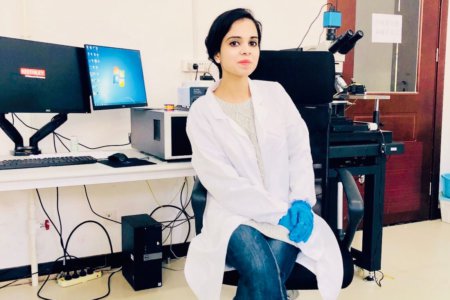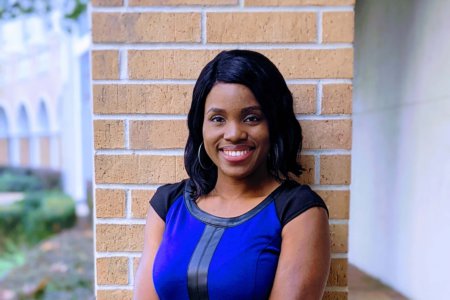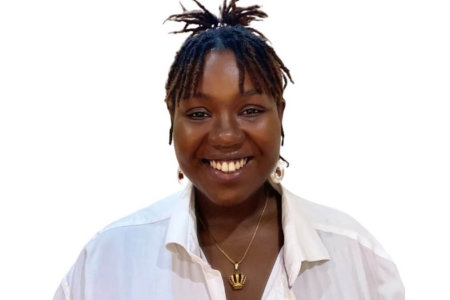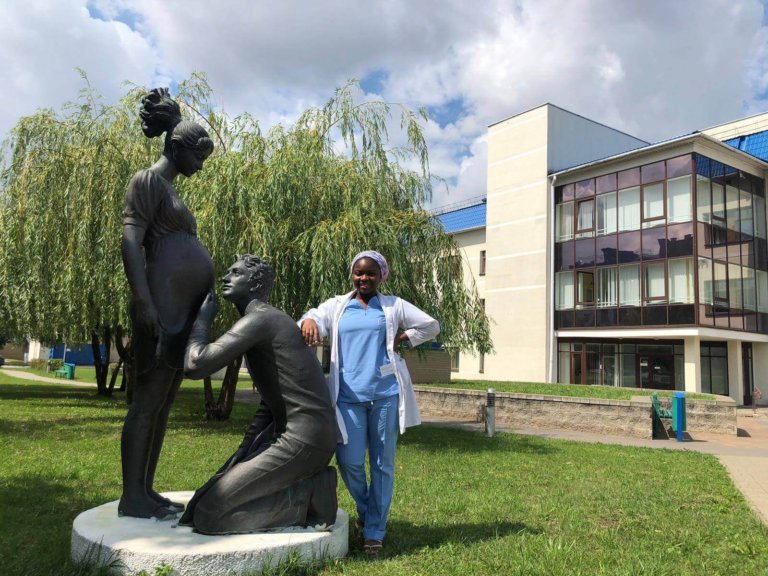
Sitting in her doctor’s chair with seemingly effortless style, Dr. Oyewo Oyenike Noimot is a woman who defies labels and odds. The former medical student from Nigeria is a graduate of Vitebsk State Medical University, and is reportedly the first Black obstetrics and gynaecology (OB-GYN) doctor in Belarus. She wears multiple hats as a mother, fashion designer, entrepreneur, and advocate for women’s health. Yet her natural charm belies her narrative, one that is hard-won through years of adversity as a medical student.
Oyenike, as she liked to be called, arrived in Belarus on a mission years ago, but found that her plans were soon derailed by the shocking discovery of deception by agents back home about her study programme, and an unexpected pregnancy during medical school. “It was the biggest shock of my life. I was just 18. You know – everything just paused.”
Before her sojourn to the country, Oyenike admits to being unfamiliar with Belarus and had never considered it as a study destination. She was doing a foundation course at a Nigerian university when she was introduced to an agent who recommended studying medicine in Belarus.
“He was like, ‘Oh, I have a country. You don’t need a visa to go there; you’ll get your visa on arrival.’” she recounts. Bypassing stringent visa requirements is particularly attractive for Nigerian students, who are often saddled with bureaucratic and financial hurdles in the application process. “He said that it was a good opportunity and the school was affordable.”
Determined to pursue her calling as an OB-GYN, Oyenike went to Belarus with other students eager to begin their study abroad chapter. Little did they know of the grim reality awaiting them upon arrival.
The language barrier would only be the first of many challenges that she had to overcome. “We were kind of duped. We were told that we’d be placed in a medical school, but were immediately taken into a language school instead.”
Still, Oyenike was one of the fortunate ones who managed to get into medical school. “I was actually in Grodno [another state], but was admitted to Vitebsk after three months of language study. Others were not so lucky.”
“Go home, go back to your country”: A medical student’s harrowing journey
From then on, everything seemed to be conspiring against her. Not long after her studies began at Vitebsk, Oyenike discovered that she was pregnant at 18. Young and alone, she had limited resources to access adequate healthcare, accommodations, and financial help as an international medical student.
Her saving grace? The pure grit and willpower to prove she could succeed despite the odds, and the help of a supportive friend and African community in Belarus.
“I was left alone with the pregnancy, and I had a lot of complications with it. At the time, my friend who came to Belarus with me was admitted to my university, so we asked to be placed in the same room so she could support me,” Oyenike recalls.
The young expectant mother didn’t let her situation override her ambition, but academia had other ideas. “In my university, you cannot miss classes after a certain period of time, or you’ll be expelled. In Belarus, getting expelled [as an international student] means going home.”
Not everything was smooth-sailing when it came to pleading her case with the university’s administration. “I just told them I needed some time to figure things out. And I recall this woman – she was so strict. She just said, ‘Go home, go back to your country. You don’t speak the language. What are you doing here? You can’t survive.’”
It was that defining moment that sparked Oyenike’s defiance to succeed despite her situation. “I was having a lot of toxicosis because of the pregnancy and feeling so sick. But I didn’t allow that to stop me. I just had to study ahead.”
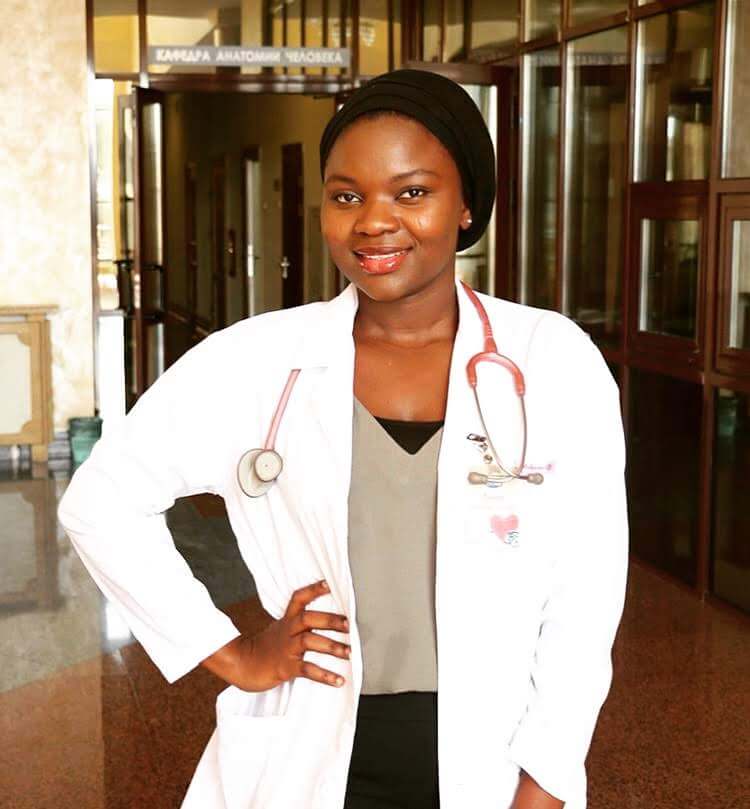
Oyenike succeeded through grit, resourcefulness, and the support of the Nigerian community in Belarus who were inspired by her journey. Source: Oyewo Oyenike Noimot
To boost her falling grades, she would attend classes at 7 a.m. every day without breaks, even when she was feeling tired. “They didn’t give me any break,” she recalls of that period. “I was the first Black student to get pregnant and wanted to continue with the pregnancy in school. They keep asking me how I would survive all that. But as a woman, it’s in that type of situation that we really find ourselves.”
Not one to be deterred from her dream, the former medical student made up for her outstanding courses within a month. Her dedication and passion shone through, which did not go unnoticed. “I was permitted to continue studying, and after giving birth, the university told me that every class I missed due to the birth was free of charge!”
“I wanted to finish medical school, and they just supported me. They really helped me.” She unexpectedly found help from other Nigerians too, who understood her situation. “The Nigerian community here were really good to me as well as they contributed to my hospital bills. I had no money.”
That same community would see her through her medical degree. Faced with financial difficulties and debt, she almost didn’t make it to the finish line. Her inspiring story, however, struck a chord with many from all over the world. Setting up a GoFundMe account, Oyenike received donations from kind strangers who helped settle her tuition fees.
From medical student to doctor: A day in the life
So what does a day look like now for the first Black OB-GYN doctor in Belarus?
“I’m always just prepared for anything,” she quipped, regarding her day-to-day work at her clinic. That certainly can be applied to many areas of her life, which also includes a food business on the side, advocacy work on women’s health, and raising a young son.
Oyenike does receive a few raised eyebrows as a Black doctor, something that African doctors are all-too-familiar with in Belarus. Trust can be hard to come by, which is important for patient-doctor relationships. “I studied here, but [sometimes] they don’t trust you enough, like you’re not up to their standards.”
That hasn’t stopped her from winning on multiple fronts. She runs a food business on the side and creates stylish dresses on her own — a continuation of her zeal in running side businesses as a medical student. Many of her self-taught skills are now passed on to younger students so they’ll learn soft skills that can help them financially. “I just have this group of girls to give them some sort of support, and I give them a job to do.”
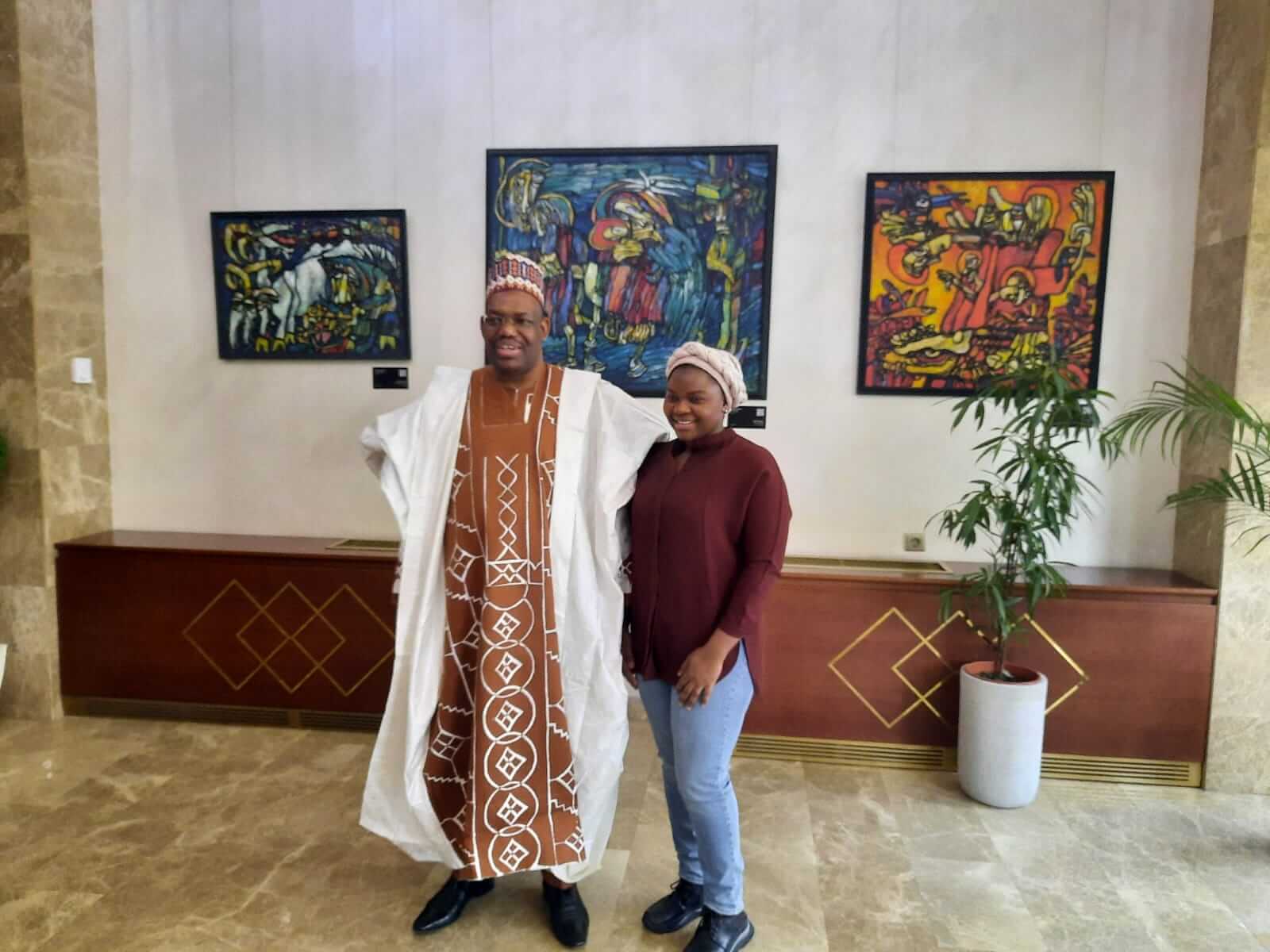
Oyenike poses with the Nigerian ambassador to Russia Abdullahi Y. Shehu. Source: Oyewo Oyenike Noimot
Although she has settled in Belarus, Oyenike hasn’t forgotten her roots. After all, it was her midwife mother who inspired her to become a gynaecologist. “I’ve always been with her in the cleaning,” she remarks of her supporting role in her mother’s small clinic growing up.
Oyenike tries to teach about proper healthcare and hygiene where she can each time she goes back home. She even provides a safe space for women to talk about sexual violence, a taboo topic that is rampant in rural communities.
She encourages budding medical students to look for opportunities in countries such as Turkey or Russia, instead of just UK and US medical schools. “Be sure of where you stand when deciding on a location. Look for scholarships and funding that can cover you 100%.”
When asked where she sees herself in five years, Oyenike holds firm to her conviction. “I told God when I’m a doctor, I’ll come back home. If I don’t live in Nigeria, I will try as much as possible to support the healthcare system in my rural area where I know it is much more needed.”








